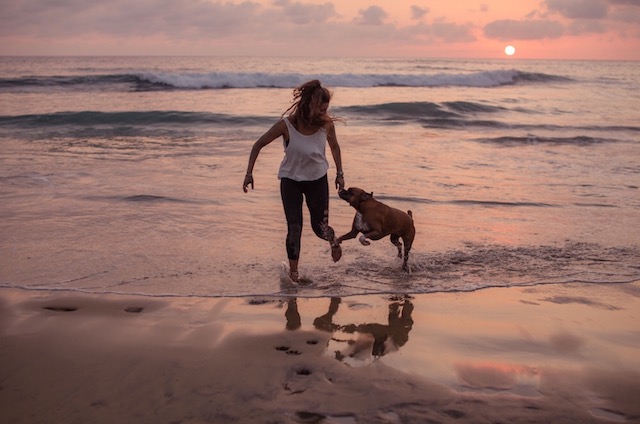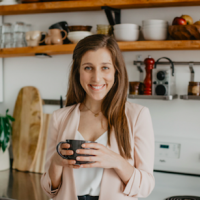
I seriously never thought this day would come.
The day where overthinking, over-analyzing and fear stopped controlling my life.
The day where I no longer felt paralyzed and frozen nearly every day.
Although this moment has been in the making for years, one day I woke up, and I was completely bored of my own fear; I was sick of my own stories and my own sh*t.
Most people who know me have no idea how much anxiety I used to experience on a regular basis. Probably stemming from the assumption that because I’m a yoga teacher, I write the type of poems you would read in savasana, and the articles I write are usually about access points to the underlying current of ease in this life experience.
There’s no way someone that does that for a living would be—or have been—crippled by anxiety, right?
Wrong.
A huge reason I got hooked on the practice of yoga and meditation was because of my anxiety. And it was a big reason I kept coming back so much, until I ended up becoming a yoga teacher myself to share my passion for these powerful and life changing practices.
Anyone who suffers from anxiety knows that it’s not like a light switch you can just turn off. It takes time, it takes patience, and it takes a whole lot of practice.
Even when I first started teaching yoga, it was still strong enough that I would sometimes have full blown anxiety attacks before class and afterward. When everyone left, I would just cry, sitting with the feeling that everyone hated the class.
Sometimes the fear, anxiety and torment would be so loud that I would get my classes covered or try to find a way to call in sick—even though I knew deep down I really wanted to do it. The fear was just so loud and controlling that it kept me stuck in so many ways.
I would attempt to practice just observing my thoughts, sitting in the seat of the witness and all the yogic concepts and philosophies of non-judgment and non-violence. But you know what, sometimes the practices alone aren’t enough and we need additional help to get out of our minds and into our lives.
I know I did.
It affected all parts of my life—my friendships, my work and my day to day living.
Some days I would wake up feeling completely frozen, unable to get out of bed or even reach for a book. It was a different kind of anxiety, it didn’t make me hypervigilant and hyperventilate like it does for some people; I would be just be glued to my bed with irrational fear.
Even when I started writing, and would post something on social media or publish an article, I would shut off all my devices and avoid technology for at least 24 hours because of the fear of how it would be received.
I would totally get that vulnerability hangover the next day and catastrophize the “negative effect” sharing my experiences would have on my life. That people would think I’m crazy, over emotional or downright insane.
During conversations with people, I would try to be present, but the ruminating thoughts in my mind were so loud that I couldn’t help but create a story about how much this person doesn’t actually want to be talking to me or spending time with me; I felt this way with even my closest family and friends.
And what I found the most ironic was the amount of comments I would get about how calm people felt around me or how I help put them at such ease.
I would smile and say, “I’m glad to help in any way.” But simultaneously think to my self, “Um, what? If you only knew what it’s like to live in my own head.”
If people actually knew how much daily distress I was in, I’m sure some might’ve asked why I keep putting myself in situations that cause me stress and continuously go through it.
The reason is, regardless of how horrible and uncomfortable the anxiety was, I could feel it lessening in the most microscopic of ways every time I would show up and move through it.
Over time, with much effort on my part, the intensity of my anxiety dwindled immensely.
And then one day day when I woke up, it felt like the grip it had on me and my life completely lifted.
It feel spacious, light, and I felt so damn free.
I thank yoga, meditation and therapy.
It has taken years and years of cultivating a consistent yoga and meditation practice, and taking the time every day to reconnect to that underlying current of ease.
It has taken a huge shift in perception of what I thought it was to be strong. It isn’t to buckle down and power through it; it’s to recognize when we need to ask for help.
In addition to what I was doing, I also thank time. I think eventually we just get so sick and tired of our own fear that we’ll wake up one day and realize how futile the amount of energy that was going toward those types of anxiety and fear controlled thoughts really is.
One day, we’ll get a surge of urgency that this way of living is no way to really live.
I know for me I had to hit rock bottom emotionally before I finally realized that I needed a change and that I needed help.
Fear will always be there in the background, and it has its place. We definitely do need to see it, hear it and acknowledge it. But for the love of all that is, we can not let it be the place where we make our decisions from. We can not let fear be in the driver seat of this precious life adventure.
Life is too damn short to live like that, and it’s a complete and total waste of our time here.
I truly hope people don’t have to spend as many years as I did with anxiety and can find practices that allow them to experience a true sense of freedom.
But something important to remember—to get to that day where we can say f*ck it—it takes patience, it takes practice, and it takes alot (a lot) of self compassion.
Through cultivating a consistent yoga and meditation practice, and sitting in the seat of the witness, we get to practice allowing everything to be exactly as it is—our fears and anxieties included. Something magical happens when we do this on a regular basis; the grip it has on us begins to lessen as we see it without any story or judgement.
As Swami Kripalu says, “The highest form of spiritual practice is self observation without judgement.”
The more we unplug from external stimulus, and drop beneath our societal roles, titles, and even our current moods and emotions—we reach the sweet center of our true essence beneath it all.
The wholeness, the completeness, the inherent enough-ness that we are by simply being human.
It’s our natural state, and it’s our birthright by being here.
Of course I still have my moments, but now in the midst of chaos, that underlying current of ease is so much louder and stronger.
And yes, at times I have thoughts of self doubt, but they no longer inhibit me from saying what I want to say or doing what I actually desire to do.
The way I teach, share, create and show up has changed drastically over the last few years. The more time I spend sitting with myself, the less I care how my art or what I say is recieved. Because I’m not my art, I’m not my words, and I’m not the way in which I teach.
I’m what’s beneath it all.
That which is eternal, as old as time and here to simply experience what it is to be alive.
I truly believe, to the core of my being, all people deserve to feel at ease and deeply at peace.
But if that sense of ease and peace is far from accessible, and the grip of anxiety is so tight: reach out, speak up, get help and remember, we are not meant to go through it alone. There are so many people out there to hear us and see us—from our friends and family to support groups and professionals.
Because yes, life sure can be heavy, serious and rather chaotic.
But can also feel fluid, light and so deliciously free.
~
Author: Alexa Torontow
Image: Author’s Own
Editor: Travis May








Read 30 comments and reply